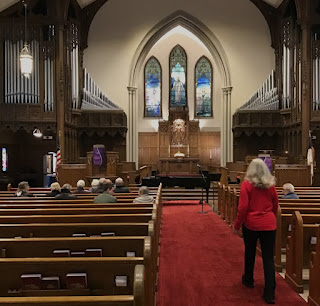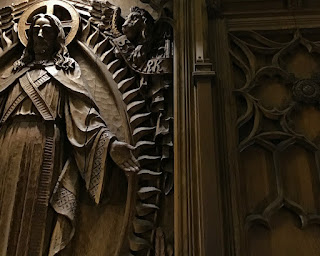Tangents from today's "Tuesday Men's Bible Study" (online) touched on some basic but likely overlooked and taken for granted elements of the organizational shape of the church as it has come to be in 2025.
<When did Christmas overtake Easter as the high point in the annual life of the church?>
Hints in the Bible that the events around the time of Jesus' birth must have been spring (shepherds in the fields - not a winter solstice practice). But ancient Romans had a pagan festival around then. So when Constantine elevated this religion to a national (empire-wide) institution, then Christmas eclipsed the pagan proceedings of late December. But only with the Industrial destruction and commodification of mass markets did the Victorian (1837+) songs and decorations arise.
<While alive Jesus did not ask to be worshiped, but now?>
God as love; God as flesh and blood; God as self-sacrificing - Jesus is all these things. But while alive it is the human part that is most important; not as incarnation of God in order to make everyone stop and worship Holy Righteousness. Neither is the Holy Spirit an object of worship; only God the Father (in triune form) is venerated in worship private or collective.
<About the "Order of Worship" and intrusion of Latin into formal worship until Vatican-2 in the early 1960s>
The primitive (outlawed) Christian church met in houses and conducted celebrations of worship largely in the pattern of Jewish worship since Jesus "came not to abolish but to fulfill The Law" as written in the Hebrew Bible/old testament. Once Constantine made Christianity the official institution for ruler and ruled alike, then all kinds of offices, titles, hierarchies, entitlements, rules and pomp began to grow. The Hebrew Bible was translated to Latin, as were the chapters going into the new testament (going from Greek to Latin). Basilicas and cathedrals were constructed, priests were trained, confessions were heard, documents were archived, on and on.
Until the Protestant Reformation, vernacular/local languages would be used for sermons and homilies, conversations and ministering to people outside of formal worship settings. Only the reading of scripture and the conducting of ceremonies (Weddings, Funerals, Baptisms, and so on) would be Latin-only for centuries (Constantine in 300 CE to Protestant translations of the Bibles in the 1500s and 1600s onward). And while the Protestants ever more relied on the language understood by worshipers, in the Catholic church until the four sessions of the Second Vatican Council (1962-1966), Latin still anchored the church life to the centuries since Constantine.
In other words, for Catholics conducting worship services in Latin, it is not like parishioners knew nothing of the syllables filling the air. Parts of the experience were in their own language; only the scripture and the ceremonial texts were kept in Latin.
<Early church: before a codified Bible with numbered chapters and verses; when did worship services designate the GOSPELS Mark, Mathew, Luke... and decades later, John>
Studying the structure and content of the books regarded as the Gospels suggests that Mark wrote his account first, then Mathew and Luke, but then John's version came much later (some years after the destruction of the Temple in AD 70). Mathew and Luke reference some of Mark's wording. And Mathew seems to refer to another source, today called "Q," as well. In the eyes of the Gospel writers, they were putting on paper their accounts; not as living saints with golden words, but as loyal followers of Jesus who were striving to illustrate certain themes and orientations. Their selected illustrations are only a fraction of the much larger, real-life events that they document.
<How did the crucifix replace the earlier symbols found in catacombs: lamb or shepherd's crook>
Probably the use of the cross only came after Roman authorities stopped using this method of painful killing. Once it no longer had personal and vivid meaning to the average person, the shape could be used to remind Christians new and old of the climax of the Jesus story - being killed. But three days later being raised up, meeting up with Disciples and later ascending to the right hand of God the Father.


